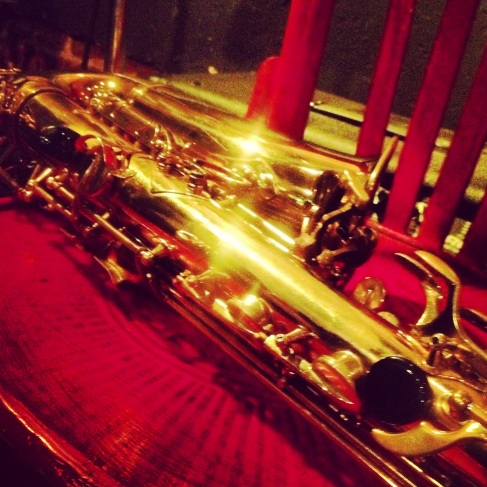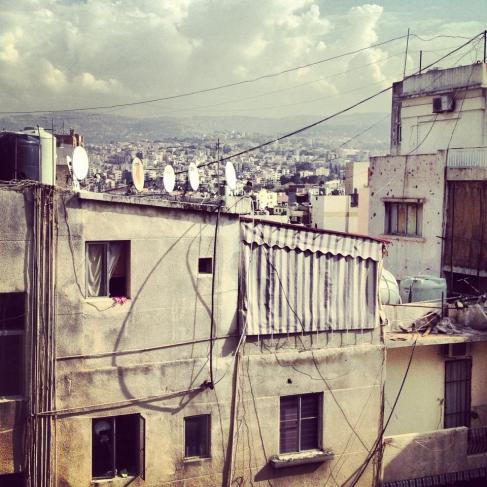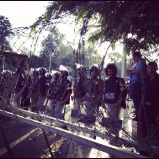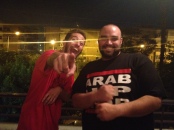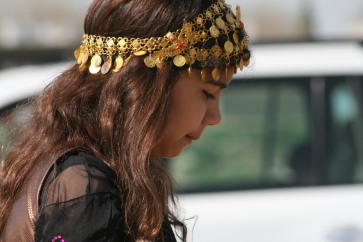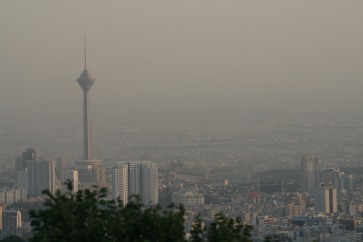Intro to the book of reportages by Nataliya Gumenyuk, a Ukrainian journalist reporting on the post-Arab spring development in Egypt, Tunisian, Jordan, Syria, and also Turkey, Palestine, Iran and Iraq
“It’s just cucumbers that are smaller here in Ukraine, everything else is the same,” I write to the Egyptian artist and film director Bassem Yusri, as I get ready to go to Cairo for the first time. Bassem sent me a copy of his ironic movie so that I would be ready to talk about his politically engaged art. In this film, shot a year before the ‘Arab Spring’, Bassem mocks the government-controlled television of Egypt in the Hosni Mubarak era. The director plays the role of a presenter who, instead of reading the news, stays silent or says meaningless phrases, shouts something out, and in the end chews a huge cucumber – no, there aren’t any like that in Ukrainian cities, either. Bassem’s pre-revolutionary work has the odour of disbelief, frustration and even anger.
“I didn’t believe that the regime in Egypt would ever change. I received a scholarship and moved to the US, and I was sure that I wouldn’t return to Cairo. I thought that my country was in a terrible state, that hopelessness prevailed there. Why torture myself?”
Bassem returned to Egypt at the exact time when in another Arab country – Tunisia – the people took to the streets, outraged at widespread corruption, brutality and the police’s impunity. When the Tunisian leader ben Ali resigned, the protests spread to Egypt as well. That the regimes which had remained in power for decades in Tunisia, Egypt, Yemen, Libya, could collapse, and that in Jordan, Syria, Bahrain, the people would dare to protest – these things were impossible to believe.
At that time in Ukraine, the Yanukovych regime was rolling back civil liberties. On Ukrainian television, the budgets for talent shows were increased; the news resembled Russian state TV in its loyalty to the government, or was just limited to crime reports, while the foreign news mostly reported celebrity weddings, and the main task of the international correspondents was to translate these notes. “Why should Ukrainians care who’s president of the United States?” the editor of one of the central channels said to me when I offered to prepare a report about the American elections. The only thing that you could talk about was European integration, but only from the most popular perspective: how difficult is it to get a Schengen visa? Among media circles it was quite often mentioned that it was too late now, that it was time to move to Europe. Another option was to be a tourist in your own country, hiding away in your own world, far from politics.
The changes in the Middle East seemed pretty far away in Ukraine. The comment you often heard when it came to the ‘Arab spring’ was: “We know how this is going to end.” On the anniversary of the Orange Revolution, perhaps in one of the cafes along the Kreshchatyk, I noticed people with orange ribbons, although on Facebook I didn’t really like to recall “where I was in November 2004”. Western journalists kept asking why Ukrainians had not taken to the streets in defence of Yulia Tymoshenko; and then they wrote about the pro-Russian government and the pro-Western opposition, with the obligatory mention of the ‘Russian-speaking east’ and the ‘Ukrainian-speaking west’. Meanwhile, the foreign press’s emotional immersion in the protests in Cairo and Tunis quickly changed into debates about the demands of the liberals and the fundamentalists, the Western and Islamic civilisations.
I also wondered why, when it comes to Ukraine, it was necessary to oppose East and West, Brussels and Moscow, the Russian and Ukrainian languages; and in the case of the Middle East, Islam and Christianity, Bin Laden and the White House, fundamentalists and liberals,… meanwhile, the people were taking to the streets to protest against corruption, the police’s impunity, the repression of freedom, and the poverty, trying to confront the regimes that allocated public resources among their family members by transferring money to offshore accounts in the Caymans and the Virgin Islands. If we have similar problems in Ukraine, why do they first of all mention jihadists, or ‘the legitimacy of spheres of geopolitical influence in the post-Soviet space’? Another issue which resembled the Arab revolutions: what happens after the dictator is deposed, and the people leave the square?
I left the central media; but having experience in television, after visited several dozen countries and attended a lot of conferences, seminars and training programs, I had many friends around the globe, but no-one out in the Arab world. The contacts I wanted would not come out of nowhere. So, with just $500 left for a ticket and expenses, at the earliest opportunity I dared to fly out to a minor conference on the rule of law organised by some British acquaintances in Amman for Iraqi, Lebanese and Jordanian leaders of civil society. I was not a Lebanese woman, not a Jordanian woman; I had no connection to Iraq, I could not share the British experience of upholding the rule of law. Still, I thought it was at least a chance to meet someone from the ‘Arab Spring’ generation – as I usually thought of those who would become the heroes of my reports.
The young and successful leaders of the organisations involved in human rights, women’s rights and conflict resolution, were all intelligent and well-educated, their parents were influential, and they did pretty good business. And the girls had Louis Vuitton bags and Armani shoes, and most of the guys had expensive watches and brand new SUVs. When I asked how to get to the Dead Sea by public transport, they gave me the number of a driver who would take about $100 for a taxi ride, and recommended a good five-star hotel. In the evening, when the conference ended and the participants planned to go to the best restaurant in Amman, I realised that I didn’t see any point in it, and I got out of the taxi halfway. I went to find a stone house with scraps of old trousers patching the broken window in the bathroom, where I was supposed to meet some street activists, hip-hop musicians, artists, who I had found online at the last minute. Since then, saving every penny, I have looked for the cheapest flights, I slept in airports, travelled from city to city by public transport or hitching lifts, from Amman to Tunis, from Cairo to Tehran, from Palestine to the Syrian border, down to Baghdad, Istanbul and Beirut, for almost two years, I asked everyone I met about the revolutionary struggle, the everyday post-war and post-revolutionary life, the disappointments, the search inside oneself, and for inspiration – so that together with the community activists and apolitical hipsters, the artists and musicians, the cyber-dissidents and bureaucrats, the Islamists and atheists, the former and not so former soldiers, the peasants and townspeople, there, in the Middle East – I could search for the revolution which, it seemed, had already been lost.
Occasionally I returned to Kyiv to join another protest action in the movement against censorship, to discuss the further curtailing of freedoms, trying to understand why Ihor Indylo, tortured by the police, had not become our Khaled Saeed or Mohammed Bouazizi; the tragic deaths of these two had led to mass demonstrations in Egypt and Tunisia, but the revolt in Vradiyivka – a village in the south of Ukraine where local policemen raped and beat up a girl – lasted only four days.
The Middle East was inspiring because it seemed that the people were operating in much harder and riskier circumstances than in Ukraine; the Arab bloggers were not only arguing about different ideas of history, but were also reporting from the streets, and were among the people all the time; the fighters against corruption organised anonymous online platforms so that officials who had witnessed money laundering could share this information with lawyers. Finally, as I then maybe naively thought, no one was hoping that someone would come and save them straight away. The Ukrainians were hoping to be rescued by their undeniable historical affiliation with European civilisation and their common border, whereas the Arabs could not become part of the European Community.
I realised that a book should come out of all of this, and so I planned to spend the winter of 2013/4 in Cairo, to write about the three years of Tahrir Square, and above all to learn more about the Syrian refugees in Beirut.
Having received an invitation to the summit in Vilnius (European integration was still almost the only international theme in the Ukrainian media), at the invitation of a European foundation I agreed to fly to the Lithuanian capital with students, and at the same time I was going to prepare the first broadcast of the Association Agreement between Ukraine and the EU for Hromadske.TV – an independent online television run by a group of the Ukrainian journalists which has become the go-to-news media during the Maidan revolution and further conflict in Ukraine.
“I’ll be back after Vilnius,” I said in Beirut, a day before the Ukrainian government announced that it would not sign the Association Agreement. There, in Lithuania, it seemed as if something else might still change, although the Ukrainian opposition leaders explained to the media that it was worth preparing for the elections in 2015, as if there were no protesters on the streets of Kyiv. The confused Ukrainian journalists and civil activists returned to Kyiv on the same flight, of course, talking about nothing else than what would happen after the Berkut troops dispersed the students. Then there was the Maidan, Crimea, the Donbas. Of course, no Beirut, no Cairo, no Tunis. Of course, I never wrote to anyone that I wasn’t coming. And I responded unusually briefly to the reports of what was happening in Ukraine. What was special was that the replies from Cairo, Amman and Tunisia did not contain sympathy or pity, but rather expressions of solidarity.
“You know what made me angry, when I was last in London, and I was presenting an exhibition where there were a lot of Arab artists sharing their experiences about what is happening in the Arab world?” I recalled the words of Bassem, the Egyptian artist. “Often at the end of the performances or exhibitions, the audience had tears in their eyes. The first question that the audience put was: ‘How can we help you?’ There’s something deeply wrong in this. We are not victims of an earthquake. We lived through something very complicated, but we did it of our own free will. Even the Syrians did not oppose the volcano. People deliberately take risks, they are ready for a confrontation, they are bold. But I don’t understand why we put ourselves in the position of the victim. Too much drama, rushing around, too many labels. When the police fired at us, the Egyptians kept on making jokes. Similarly, when politicians reveal their connections and hand out the money, it doesn’t often mean a clash of civilisations, as people so often say.

While we had the Maidan, Crimea, the Donbass, Recep Tayyip Erdogan was still re-elected president of Turkey, even though Gezi Park had demonstrated against him; and after a year of rule by the Muslim Brotherhood, once again a general became president of Egypt with dictatorial powers – albeit not as corrupt, compared to Mubarak. In Tunisia the Islamists who came to power after the revolution still lost the elections, which were still democratic. The Jordanians have become more cautious because of the threat of the ‘Islamic State’, whose brutality has even been condemned by al-Qaeda. Meanwhile Iraq and Syria have fallen under their control. The death toll in the war in Syria has only increased, and a victory over Bashar Assad now seems not just illusory, but sometimes seems as if it could threaten to radicalise the whole region.
‘Peace in the Middle East is more unlikely than ever’ – for half a century foreign journalists have started and finished their reports that way. Generalising, frightened of ‘inevitable Islamisation’ and ‘an Arab winter’. Most often adopting the position of the elder brother, who criticises the younger for his lack of pragmatism. This romanticised notion of the ‘Arab Spring’ has never been directly employed by the Arab media; it was first used in the American magazine Foreign Policy. Meanwhile most Egyptians, Tunisians, Yemenis emphasise that systemic changes need time, that the Islamists were at the helm because they were the only organised opposition. Therefore, it was not a question of religious fanaticism becoming stronger.
When two and a half years after the overthrow of Mubarak, the Egyptian military, which had some support among the public, removed the first democratically elected President Mohammed Mursi from power, and a month later killed about a thousand people while suppressing the demonstrations in support of the imprisoned leader of the Muslim Brotherhood, the world was confused. Forced to simplify the story (‘democracy against dictatorship’, ‘Islamists against liberals’, ‘Muslims against Christians’), the media talked about ‘the army against the leader, who was chosen by the people’. We are given to understand that what is happening in Egypt or Tunisia is not so complicated; we just have to compare it with similar political processes in our own country.
Ukrainians are outraged when the foreign press, both western and Russian, writes about the country being split into Ukrainian and Russian, East and West, about the ‘irreconcilable opposition of supporters of Europe and Russia’. However, we readily use the word ‘split’ when it comes to liberals and Islamists in the Middle East. We readily speak of ‘separatism’ in other countries, while insisting that the separation of Crimea was artificial, unnatural. We explain that the language issue is not the number one problem, but rather the map which the politicians are playing with. And so we should understand that in the Arab world, the best way to distract voters from economic problems is religion. Ukrainians are outraged when the foreign media draw conclusions about the racism of the whole population based on a video about the far-right, and all follow the herd about ‘fascism’ because of the red and black flags on the Maidan. Likewise, the Islamists in Egypt do not represent the entire population. The Ukrainians who did not vote for President Yanukovych argued that winning the elections does not constitute the endorsement of the majority. Meanwhile in the case of Egypt, the Muslim Brotherhood had the support of one-eighth of the population.
“The revolutionaries wanted the best, but were naive and as a result they got war”; so ran the text I noticed in an eminent American magazine. This time they were wearily summing up the Ukrainian Maidan. We really do not want the West to give up on the Ukrainian revolution, because we have a civil society, we have independent media, we have educated young people. However, attempts to show, on the basis of the same factors, that everything is still possible in the Middle East are often met with scepticism in Ukraine, because it has to do with different people.
Analysts, political scientists, media people who have grown accustomed to ‘velvet’ revolutions often consider the current uprising in the light of the standard principle: in place of the bad dictator there should be the good opposition. If you don’t get the prime minister’s chair – you have automatically lost. Meanwhile, among the Arab revolutionaries I noticed much less frustration and discouragement. When analysing the situation, they themselves told how the ones who came to the forefront were the classic ‘old regime’ figures, together with the representatives of the parties that were conventionally in opposition, but were always ready to compromise. They also complain about the new generation of activists who seek a glory that was so easy to get as the people came out onto the square. The new revolutionaries want to be on TV; but sometimes they lack endurance, strategy and an understanding of the essence of the Revolution.
The particular feature of the Arab transformations is that it was not a matter of just replacing evil rulers with good oppositionists. The aim is to change the game, or at least to force whoever leads the country to play by the rules. The citizens understand that it is naive to think that the Islamists who benefited from the revolution, or the military who, for example in Egypt, controls the financial flows, will hand over control. But little by little, even if it is sometimes a situation of ‘two steps forward, one step back’, the system makes advances, because it simply cannot continue not to hear and to ignore the citizens.
Although the government uses any mechanisms it can to resist change, now it is especially necessary to procrastinate in the defence of prisoners, to help the families of those who have lost parents or children during the confrontation. In the meantime, activists have to compete in the political space with those who are able to buy votes for a bag of sugar and a bottle of oil, and any idea can extremely simply be discredited, destroyed, silenced, talked over and lost among the noise of information.
“They say about me that I work for the CIA, Mossad and the KGB all at the same time. Even if I was a saint, they can portray me as a spy, and reduce the entire history of the Revolution to another conspiracy theory. And someone stops trusting me. And this is done consciously by those who know that some ideas are stronger than power and money,” explains Wael Abbas, one of Egypt’s most influential bloggers.
“My film about the revolution in Egypt – I will take five years to shoot it,” says a Cairo documentary maker. “Our future seems very difficult, but there is hope. It’s not a matter of five or ten years. We will see the result after fifty years. For this alone, we have to do something, at least,” adds another director.
This dialogue took place long before the Maidan in Kiev, when we were sitting on plastic chairs in a street cafe near Tahrir Square. Alongside us stood a car with its windows open; its owner only came along after a few hours, to take out a bag with a laptop.
“Listen, why didn’t he lock the car up? Is it so safe here?”
“This is the old town, everybody knows each other, why should he bother?”
This book, which was conceived as a collection of stories about the Arab revolution and the post-revolutionary changes, also talks about things which are not often seen in news reports: the circumstances in which all these people who became the heroes of global news live and work. Still now, when it comes to the Arab world, you are unlikely to hear the name of anyone other than the dictator. When the Middle East was mentioned, images come forth of sheikhs, jihadists, women in hijabs and sometimes Bedouins. Today, in each of these countries we can distinguish a hundred faces, activists and politicians, artists and office workers, as well as ordinary people from the squares. They are far away, yet so close. And in trying to understand them, we can learn a little more about ourselves.




